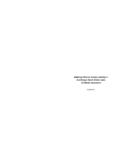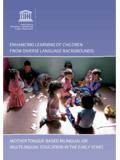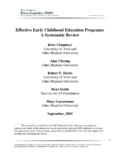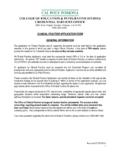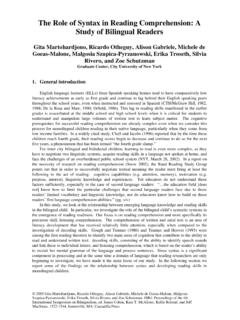Transcription of The Case Against Bilingual and Multilingual …
1 The Case Against Bilingual andMultilingual education in SouthAfricaKathleen HeughPRAESAPRAESA Occasional Papers No. 621 The immediate The historical The context of language in Policy review and , myths and Myth 1: There is no or not enough indigenous SouthAfrican Myth 2: Parents want straight for English or English Myth 3: English is the only language which has thecapacity to deliver quality education to the majority;African languages do not or Myth 4: Many South African children do not have amother tongue and therefore do not need mother Myth 5: Bilingual or Multilingual education is tooexpensive and we have only one option: English only(or mainly).
2 Case Against Bilingual & Mutlilingual education in South Africa3 The Case Against Bilingual and MultilingualEducation in South Africa11. IntroductionThe issue of language in education in South Africa at the turn of themillennium remains heavily contested. Apartheid language in educationpolicy infused with unequal language proficiency demands for school pupilsin the country was replaced in 1997 with a new policy based on non-discriminatory language use and the internationally accepted principle ofmother tongue education in the context of a Bilingual or multilingualframework. It was designed to guarantee pupils the best possible access toand proficiency in another language (English for the majority of pupils)alongside the language best known by pupils upon entry to school.
3 Thepolicy has not been accompanied or followed by any significant govern-ment initiated implementation plan. It has, however, been met with severalarguments Against its implementation and these have found their way intopublications which are now being used to deflect government s responsibil-ity regarding implementation. Whilst government remains inert on thematter, the discriminatory policy of the former apartheid governmentcontinues to be practised in which is directed Against Bilingual education in South Africais not new. An examination of education in South Africa shows the uncannyway in which history repeats itself. More than sixty years ago Malherbecomplained about the way in which the detractors of Bilingual educationthen made claims about the educational advantages of what were known asunilingual schools despite comprehensive evidence which demonstrated thelinguistic, academic and social advantages of Bilingual schools.
4 Malherbe sobservations then are equally applicable today:Unfortunately, most of these claims are made on a priori groundsand are not backed by objective data or scientific proof as far asthe South African situation is concerned. In fact, the vehemencewith which they are propounded is generally in inverse proportionto the amount of scientifically reliable data which can be adduced insupport of these views. Assertion alone does not necessarily verify astatement (Malherbe 1943: 38).PRAESA Occasional Papers No. 642experience feelings which range from fear of being found out, guilt orincompetence (FDE Multilingual education students 1999:Personalcommunication).
5 In other words, I can understand that educatorswho are attempting to report on language in education practice mightrely on teachers and school principals initial reports of which lan-guage is used as the medium of instruction. If these educators were,however, to explore the actual situation in the classrooms, what theyhear might be very different from what they have been work of Cummins, Swain, Skutnabb-Kangas and others is arecent development over the last two decades. It was preceded by thepractice of Bilingual education in South Africa from the late 1800s andthe study of EG Malherbe in the late 1930s and 1940s.
6 Far fromSouth African educators borrowing from international experience, weprovided the initial experience from which international research hasbenefited. See 1976, African language speaking students had mother tongueinstruction for 8 years. After SOWETO this was reduced, first to 6and later to 4 years, followed by a sudden switch to English Department of education and Training formalised legislativechanges to the education of African children in 1979, but the secondphase of Bantu education really began with the compromise reached inpractice after the SOWETO rebellion and continued until the firstdemocratic elections of 1994.
7 What nobody recognised at the timewas that the consequences of these compromises were to wreak moredevastation upon the education of black students than the first phasecould have 1994 matriculation results were no longer published accordingto a racial/ethnic breakdown of data. Thus the 1997 results should beinterpreted Against an estimation that about 80% of candidates whopassed would have been speakers of African languages. The 10%overall decline in the pass rate between 1994 and 1997 is cause forconsiderable it is unnecessary to point out that this participant is himself ahome language speaker of an indigenous South African Mohamed said that: It is too costly to produce books in all11 languages.
8 None of the panelists or presenters at the seminarindicated that they were in disagreement with this point. (DoESeminar, Pretoria, 22 January 2000). is interesting to note that in the province (Western Cape) where80% of learners wrote their 1999 matric examination in their mothertongue, there was a 79% pass Occasional Papers No. 642. The immediate contextThe shift in political power in 1994 both necessitated and made possible areappraisal of the educational disaster facing South Africa. The Minister ofEducation, Kader Asmal, at the recent National Colloquium on Languagein education (9 June 2000) spoke of the heady days of hope and idealismwhich accompanied this historical juncture in the history of South warned, however, that the days of high-minded idealism had, now, togive way to practical, implementable solutions within the existing budget-ary constraints of government.
9 What he might have added is that it isnecessary to diagnose correctly the ailments which continue to plagueeducation, because taxpayers money ought not to be wasted on a systemwhich can only deliver failure. Remedies, which treat the symptoms andsecondary ailments without tackling the problem at source, similarly cannotbe afforded. Unfortunately, a leaden bureaucracy which includes an uneasycollection of former apartheid educational institutions, expanded with newpersonnel, has not yet shown the single-mindedness of purpose to grasp thebig picture. Under the first Minister of education after the 1994 elections,apartheid education was disaggregated for corrective treatment.
10 Thishappened in the absence of a comprehensive education policy and planintegrated into a new national plan for The approach was tolook at corrective treatment of the component parts as separate entitiesrather than as a whole. Apartheid, in contrast, began with the whole andthis was applied to the The historical contextIn hindsight, of course, it should not be surprising that apartheid succeededin accomplishing what it was set out to do. Bantu education , one of thecomponents of apartheid was, ironically, the only education policy in sub-Saharan Africa, in the last half century, which achieved that for which it wasintended.
